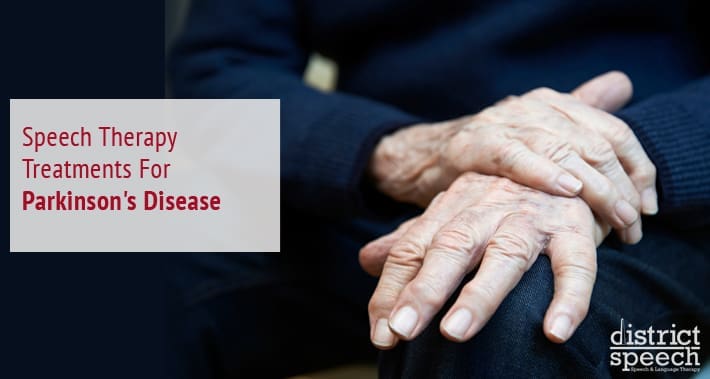
Although it’s most widely known for causing issues with movement and coordination, Parkinson’s disease can also impair your speech and vocalization.
It can significantly impact your ability to produce speech.
Do you have an older parent, relative, or friend that’s been diagnosed with Parkinson’s?
If so, you might have some experience with this already.
Or perhaps you’ve recently received a diagnosis yourself.
This may cause you to worry about the potential ramifications and what this will mean for you going forward.
“What symptoms can I expect in the coming days, months, or years?”
“Will I need help with my daily functioning?”
“How will Parkinson’s disease affect my mental health?”
Does any of this sound familiar?
Fortunately, District Speech can help with many of these worries.
We have plenty of experience helping people living with Parkinson’s preserve as much speech and communication skills as possible.
We can also address any communication deficits you may experience.
If you’re looking for a Washington DC speech therapy clinic to help mitigate the vocal issues related to Parkinson’s, you’re in the right place.
At District Speech, we want to help you understand the ways a speech therapist can provide treatment for issues related to Parkinson’s disease.
Keep reading to learn more.
What Is Parkinson’s Disease?
Parkinson’s disease is a neurological disorder.
According to the Parkinson’s foundation, approximately 10 million people worldwide live with the condition.
Many well known celebrities have famously lived with Parkinson’s as well, including Michael J. Fox, Muhammad Ali, and Neil Diamond.
Parkinson’s disease primarily affects movement, causing tremors and stiffness, and leading to problems with balance and coordination.
But it can also significantly impact speech.
Movement and coordination rely largely on your brain’s production of dopamine.
In individuals with Parkinson’s disease, the substantia nigra, the part of the brain which creates dopamine, starts to die off.
This results in lower levels of brain dopamine.
It’s a progressive disease, which means the symptoms will worsen over time.
In rare cases, Parkinson’s disease can affect children.
If your child has been diagnosed with Parkinson’s disease, pediatric speech therapy can help.
However, the vast majority of people with Parkinson’s disease are adults and will seek out adult speech therapy treatments.
What Causes Parkinson’s Disease?
The precise cause of Parkinson’s disease remains unknown.
However, experts have highlighted a number of risk factors for its development.
These factors can be both environmental and genetic.
One factor involves proteins called Lewy bodies.
Doctors have found these proteins inside the brains of many individuals with Parkinson’s disease.
However, their exact role in the condition’s development is unknown.
In addition, experts believe that low levels of dopamine and norepinephrine in the brain are linked to Parkinson’s development.
Age is perhaps the biggest risk factor for Parkinson’s development.
Most incidents of Parkinson’s disease are diagnosed in adults between fifty and sixty years of age.
Sex also appears to play a role in the condition.
According to a 2019 study by Cerri et al., men are twice as likely to develop Parkinson’s than women.
Additionally, race plays a role as well.
White individuals are more frequently diagnosed with Parkinson’s disease compared to Black or Asian individuals.
Other factors which may lead to an increased risk of Parkinson’s include:
- Genetic history, such as a family history of Parkinson’s
- History of head injury, such as traumatic brain injury or right hemisphere brain damage
- Exposure to environmental toxins, such as certain pesticides, heavy metals, or cleaning chemicals
Symptoms Of Parkinson’s Disease
The primary symptoms of Parkinson’s disease are motor problems, which include:
- Slowed movement
- Tremors and shaking
- Poor balance
- Stiffness
However, there are also other signs and symptoms, some of which are early onset signs of the disease developing, and others specifically related to speech and speech production.
Let’s take a more detailed look at the signs and symptoms associated with Parkinson’s.
General Symptoms
Some of the early onset signs which can show up before other symptoms develop include:
- Cramped handwriting
- Loss of smell
- Poor posture
- Constipation
Other signs and symptoms of Parkinson’s disease can include secondary signs such as:
- Depression and anxiety
- Psychosis and hallucinations
- Memory problems
- Blank facial expressions
- Falling backwards
- Getting stuck while walking
- Shuffling while walking
- Flakey white scales on the skin
- Visual and spatial issues
RELATED: How Can A Speech Therapist Help With Memory Issues?
Speech Related Symptoms
Some of the symptoms of Parkinson’s disease specifically related to speech and communication include:
- Dysarthria (trouble speaking)
- Dysphagia (trouble swallowing)
- Vocal changes
- Breathy, hoarse speech
- Monotone speech
- Poor articulation
- Muffled speech
RELATED: Pediatric Speech Therapy Treatment For Feeding And Swallowing Disorders

Can You Prevent Parkinson’s Disease?
Because the exact cause of Parkinson’s is unknown, it isn’t preventable.
Avoiding certain risk factors, such as environmental toxins and exposure to heavy metals, may decrease your risk of developing it.
However, you can’t exactly change your race, age, or family medical history.
It’s always a good idea to maintain a healthy diet and lifestyle.
Some research suggests that frequent aerobic exercise may reduce your likelihood of developing Parkinson’s disease and slow its progression.
For instance, a 2014 study by Shu et al. found that aerobic exercise is particular helpful for supporting motor skills, balance, and gait in people living with Parkinson’s disease.
How Can Speech Therapy For Parkinson’s Disease Help?
If you or someone you care about is experiencing speech issues related to Parkinson’s disease, a speech therapist can help.
At District Speech, our expert speech therapists have experience helping people living with Parkinson’s disease improve and preserve their speech and communication skills.
Some strategies include:
- Lee Silverman Voice Treatment, specialized training to help individuals with Parkinson’s disease amplify their voices
- Vocal energy conservation techniques
- Helping develop nonverbal communication skills
- Practicing exercises to help increase muscle strength
- Practicing movements to improve speech
Your speech therapist may also recommend augmentative and alternative communication (AAC) options to help support your communication needs.
RELATED: What Is Augementative And Alternative Communication (AAC)?
Some examples of AAC can include:
- Voice amplifiers
- Notebooks and language boards
- Palatal lift, a type of retainer
- Computers and other dedicated communication devices
- TTY telephone systems
The bottom line is that there are a variety of methods available to assist people who are losing their ability to communicate due to Parkinson’s disease.
Your speech therapist will work with you to determine the best strategies for you.
Book Your Appointment With District Speech Today
Are you in the early stages of Parkinson’s disease and want to learn strategies to help maintain your speech and communication skills as the condition progresses?
Or maybe you have a parent or loved one with Parkinson’s, and you’d like to help them maintain their speech for continued communication with friends and family.
We’re District Speech, and we can help.
Our offices serve the Washington D.C. and Arlington Virginia areas.
We even offer speech teletherapy services so you can participate in speech therapy from the comfort of your own home.
Book your appointment with District Speech today to discover our plethora of programs dedicated with your health and wellness in mind.
1300 I St NW, Suite 400 E,
Washington, DC 20005
- https://g.page/districtspeech
District Speech and Language Therapy specializes in speech therapy, physical therapy, and occupational therapy solutions, for both children and adults, in the Washington D.C and the Arlington Virginia areas.